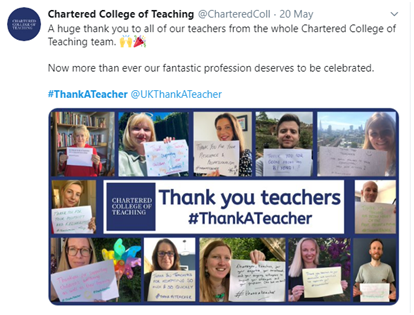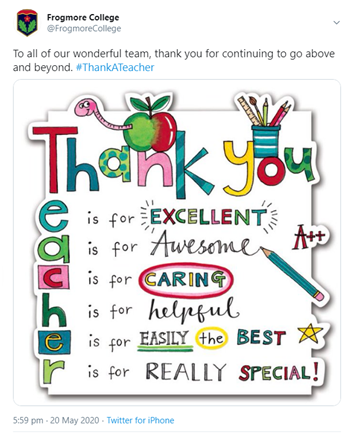It is Mental Health Awareness Week, a great time to talk about wellbeing in the educational community.
Being an educator is very demanding and our mental health is often put to the test. Due to the current circumstances and the pressure to adapt our methods so quickly whilst finding a life-work balance can be challenging. You might feel overwhelmed, stressed or sad. This is normal and you are not alone! And even if you are generally happy, it is always important to look after our mental health.
We are going to explore five different strategies that you can put in place from TODAY to improve your overall wellbeing.
1 – Practice kindness and self-compassion
The theme for this year’s Mental Health Awareness Week is kindness – What a happy coincidence that the national Thank a Teacher Day is also this week! What a better way to be kind than to thank our colleagues who go above and beyond to support us and our pupils?
Just a few examples that made me smile this week.





Research shows that practicing kindness can improve your mental wellbeing by creating positive feelings and a sense of reward, giving you a feeling of purpose and self-worth and helping you connect with other people.
Some examples of the things you could try within the teaching community include:
- Thanking our colleagues who are sharing resources, strategies, ideas and delivering CPD.
- Sharing your resources and ideas on TES or social media.
- Volunteering to create resources for organisations outside of school. I have seen opportunities on social media to translate lessons for charities, create resources for online academies, etc.
- Engaging in community projects. Many schools are creating face shields for the NHS and care homes, making and donating laundry bags, scrub bags and headbands,…
For many people, engaging in activities that require a time commitment can be difficult. We might be restricted by work, childcare, looking after a vulnerable person or even our own health. Here are some good news for you: you are already being kind by all the things you do on a day to day basis, such as cooking a meal for your children or calling a family member or friend to check how they are doing. Each and every person in the educational community are doing their best. You are doing your best!
As educators we often focus on helping other. After all, we are determined to help young people be happy and successful. However, it is also essential to be kind to yourself and develop self-compassion. How can we do this?
- Treat yourself with the same level of empathy, kindness and care that you have for your students.
- Prioritise what makes you happy and dedicate time to your hobbies.
- Allow yourself to be imperfect.
- Remember you are not alone.
- Practice mindfulness.
STEP 2 – Connect with other people
Evidence suggests that fostering good relationships and expanding our network can help us build a sense of belonging and self-worth. It can also give you an opportunity to share positive experiences and access emotional support or support others. While schools are closed, many of us miss the staff room and the opportunity to talk to colleagues. How can we meet other professionals with similar interests and attitudes?
@Toriaclaire gave a fantastic presentation this week during Downe House School’s TeachMeet #EduDH20 on the importance of personal learning networks and how you can build your own. I would like to invite you all to join #TinyVoiceTuesdayUnites. It is an incredibly supportive community which allows you to find like-minded educators to connect with. It is a place to talk about education, ask questions, etc.
If you are an MFL teacher, you can use social media to connect with other language teachers. For example, on Twitter:
- #mfltwitterati – a wonderful community, sharing so many resources and ideas!
- #mflchat – a weekly chat for the mfl teaching community. A variety of topics from a variety of hosts every Monday 8.30 – 9pm.
On Facebook ‘Secondary MFL Matters’, ‘Modern Languages Teachers’ Lounge’, ‘MFL Teachers’ Lounge’ and ‘MFL Resources and Ideas’ are just a few examples of groups of MFL teachers who engage in educational conversations, share resources and strategies and give advice.
I would also encourage you to join a professional network such as the Association for Language Learning. This is a great way to engage with a local network of active member near you. Local groups are run by volunteers to provide support, encourage collaboration and sharing good practice.
STEP 3 – Look after your physical health
Research demonstrates the importance of sleeping and eating adequately, as well as being physically active. This is not only great for your physical health and fitness, but it can also improve your mental wellbeing in a number of ways.
Whilst we are in lockdown and working from home, it can be a challenge to establish a routine and stick with it. However, is the perfect opportunity to start making small changes and embedding new habits in our life.
The following can help:
- Set and track achievable goals. You can use apps such as ‘Goalmap’ or ‘Repeat Habit Tracker’ to support you with this.
- Take part in activities with friends, family or colleagues. Why not attend a virtual exercise class together? This supports our second step of connecting with other people and it also brings in the element of accountability.
STEP 4 – Bring learning into your life
Learning a new skill can boost your confidence and self-esteem, as well as help build a sense of purpose.
You could try out new hobbies that challenge you, like learning to cook a new recipe,… For example, I have recently discovered Epicurious. A cooking channel which teaches you a recipe at four different levels, from amateur to food scientist.
You might want to practice a language or learn a new one. I would recommend that you take part in a language exchange. You can use Tandem to help you find native speakers or the language you are learning who want to learn your language in exchange.
You can also join a course:
I would also like to encourage you to take up on the amazing CPD opportunities that are available at the moment. I recently saw a very valid question online of a teacher who asked for recommendations on how to manage the time to engage in CPD, balancing it out with online teaching, household chores, etc. This might well be the case for many teachers. My tips:
- Browse through the different options and prioritise topics that you are interested in.
- Start with short sessions such as the Seneca TeachMeets, which are 25 – 30 minutes.
- Use the recordings to catch up on any sessions you have missed at a time that is suitable to you.
- Embed it in your schedule
- If you struggle to access webinars or watch presentations, start with podcasts.
There are many educational podcasts available, such as:
- #mfltwitterati podcast
- Chats with pros
- UKEdChat
- Teacher Toolkit
There are also apps such as Elevate and Deepstash to keep your brain sharp and for self improvement – the possibilities are endless!
STEP 5 – Be present
Being present and in the moment, or mindful, can boost our welbeing.
Paying attention to your mind, your body and the space around you can help you understand yourself better and positively impact how you feel about life and how you can overcome difficulties.
Meditation is not about changing or even improving, but rather about developing awareness. It is about noticing your feelings and thoughts and acknowledging them without judgment.
If you would like to explore how meditation physically affects our brain, please read the explanation provided by Harvard neuroscientist Sara Lazar. She uncovers how certain brain regions associated with healthy brain function become more substantial, while an area associated with undesirable behavior shrinks.
Willing to give it a go? I have good news for you – Headspace is offering a one year free subscription for those working in the education sector.
Would you like to find out more?
Dr C. Kuepper – Tetzel did a very useful compilation of blogs and articles with recommendations to reduce anxiety in teachers.
If you would like to discover more about the science of happiness, Professor Laurie Santos uncovers misconceptions about happiness, why we think like we do and what research says can help us in this online course. You will also be invited to take part in weekly challenges to improve your own wellbeing.
I would also recommend Laurie’s podcast called The Happiness Lab. I found this coronavirus bonus episode particularly helpful.
Ask for help
While these steps can help, if you feel that you need further support, here are some helpful links:
If you are an MFL teacher, you would have seen examples that are specific to you. However, I hope this is useful to all the educational community and I would like to invite you to write in the comments section other subject specific resources and recommendations that might be beneficial to your colleagues. What has worked for you? What are your go to strategies?